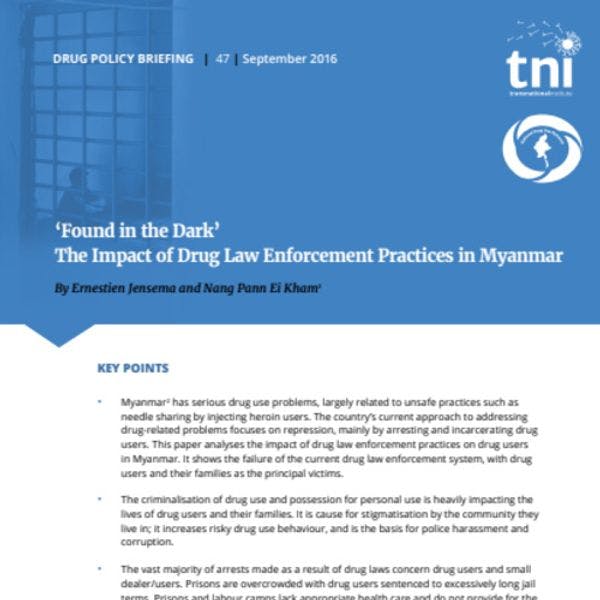‘En la oscuridad’: el impacto de las prácticas para la aplicación de la ley de drogas en Myanmar
Las políticas de drogas vigentes en Myanmar se centran principalmente en la represión y la penalización. Sin embargo, la mayoría de las detenciones afectan a los pequeños usuarios, mientras que los traficantes se libran de ellas. El TNI recomienda que las autoridades policiales y la comunidad en general acepten y adopten una política basada en pruebas empíricas.
Más información, en inglés, está disponible abajo.
-----
To address its serious drug use problems, Myanmar should change its drug policy towards a harm reduction approach. Instead of a repressive approach, voluntary and evidence-based treatment and public health services, including harm reduction, should be made available and become generally accepted by enforcement officials and by the community at large.
Situated in South East Asia’s ‘Golden Triangle’ , Myanmar is well known for poppy cultivation and opium production. International reports claim that the country is the world’s second largest opium producer after Afghanistan . Opium cultivated in Myanmar is locally consumed, especially in the mountainous ethnic regions where it also has traditional and medicinal uses. However, a large amount of opium is turned into a more dangerous form - heroin - for the local market as well as for export, mostly to countries in the region, especially China. Myanmar is also under international surveillance because of its production and export of amphetamine type stimulants (ATS). In Myanmar prevalence of problematic drug use is high, though there is no reliable data on the issue. According to official reports, the most commonly used illicit substances are heroin, opium, methamphetamines, and cannabis. Major health problems such as HIV, hepatitis B and C, drug overdoses and tuberculosis are related to risky injection practices and the sharing of smoking paraphernalia. Problematic drug use is especially related to unsafe practices by injecting heroin users.
Keep up-to-date with drug policy developments by subscribing to the IDPC Monthly Alert.
